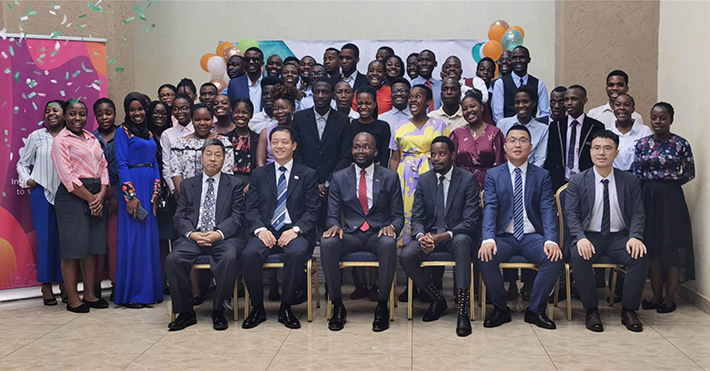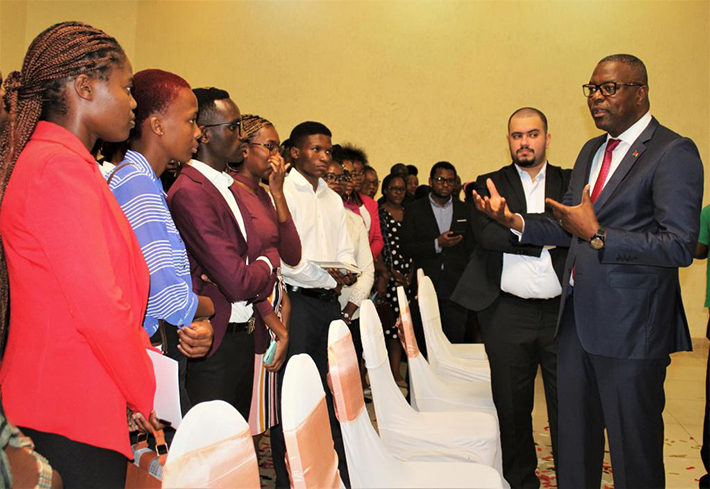|
||||||||||
| Home Nation World Business Opinion Lifestyle ChinAfrica Multimedia Columnists Documents Special Reports |
|
||||||||||
| Home Nation World Business Opinion Lifestyle ChinAfrica Multimedia Columnists Documents Special Reports |
| ChinAfrica |
| Going Digital Clarion Call |
| Empowering Malawi’s youth with ICT skills for a sustainable digital future |
| By Edwin Nyirongo | VOL. 16 February 2024 ·2024-02-20 |

Attendees pose for a group photo at the launch ceremony for the 2023 Seed for the Future Programme in Malawi’s capital Lilongwe on 20 November 2023 (CHINESE EMBASSY IN MALAWI)
Rejoice Banda, a student from the University of Malawi, sees herself as a digitally transformed person. A student of computer network equipment, she has recently acquired cutting-edge skills related to information and communications technology (ICT), thanks to training from the Seed for the Future programme in November last year.
The skills transfer is Chinese ICT giant Huawei Technologies’ global flagship training programme conducted in many countries, aimed at developing ICT skills among the youth.
“It was a highly advanced training which has changed the way I approach ICT. As a student at Computer Network Equipment, my studies will be simplified and I see a bright future for myself in the ICT sector,” said Banda.
She also confirmed that the training would assist her in her final year project at the University of Malawi.
Peace Nkhoma from the DMI University, another student who attended the training in November, said participating in Huawei’s Seeds for the Future programme was important for him because it provided a unique opportunity to gain hands-on experience and insights into the “rapidly evolving field of ICT.”
He said the programme offered valuable knowledge, exposure to the latest technologies, and a chance to interact with industry experts, which would significantly contribute to his personal and professional growth in the technology sector.
“Participating in the programme is important for my studies as it exposed me to practical knowledge and real-world applications of ICT, thus complementing the theoretical aspects taught in classrooms,” he noted.
“Moreover, for Malawi, this programme was important as it helped in nurturing local ICT talents, fostering technological innovation and contributing to my country’s development by equipping the youth with skills aligned with the digital era. The knowledge gained can be instrumental in driving progress and leveraging technology for various sectors within Malawi,” said Nkhoma, adding that he intended to share his newfound knowledge and experiences by educating those who were not fortunate enough to attend the programme.
ICT for All
With the world going digital, the rush to obtain ICT knowledge has intensified. This is also the case in Malawi where the country’s National Statistical Office puts the figure on the access and use of ICT at around 20 percent.
Malawian President Lazarus Chakwera has always emphasised the importance of ICT and even wants it to be used in government procurement.
Speaking in the capital city of Lilongwe during the 2021 ICT Expo, Chakwera instructed the Ministry of Information and Digitalisation and Public Procurement and Disposal of Assets Authority to fast track the process of digitalising their institutions for the benefit of the country.
“When I say that we are building a new Malawi, I mean a digital Malawi that is ready for the opportunities and challenges of tomorrow. When I say that we are building a new Malawi, I mean a digital Malawi that is equipped to fully engage the global community,” said Chakwera, who added that a digital Malawi can expand the reach of prosperity and public services through e-commerce and e-government.
Things are changing for the better in Malawi. Since Huawei established the Seeds for the Future programme, the country has seen increased knowledge in advanced ICT technologies, especially among college students.
This is in line with Malawi’s development agenda Malawi 2063, which promotes a “robust ICT infrastructure with cross-country coverage of reliable and affordable services fostering technological adoption and digital access.”
Malawi’s Minister of Information and Digitisation Moses Kunkuyu said training young people in ICT brings digital knowledge among future leaders of the country and this nurturing will be anchored on exchanging knowledge, getting acquainted with technology and embracing innovation.
“The combination of these elements will ensure that we are really planting seeds for the future,” said Kunkuyu. “We believe that the training will equip the youth of Malawi with creativity and critical thinking that will help to transform this country into one of the most promising digital economies in Africa,” he said.
Kunkuyu noted that since 50 percent of Malawi’s population comprises of youth, ICT cannot be accomplished if these young people are not equipped with necessary knowledge, hence, the importance of the Seeds for the Future programme. He said the programme addresses two key areas on which the government of Malawi has placed great emphasis: youth and information & communication technologies. “Through this annual training programme, over 200 talented young Malawians have been given the opportunity to broaden their horizons, deepen their knowledge and understanding of technologies and sharpen their ICT skills to allow them to contribute even more to the steady improvement of our great country,” he said.

Representatives of students participate in a ceremony to launch the 2022 Seed for the Future Programme in Malawi’s capital Lilongwe on 14 November 2022 (XINHUA)
Empowering youth through ICT
Zhang Chunfa, commercial counsellor at the Chinese embassy in Malawi, said that what Huawei is doing is a fulfilment of what Chinese President Xi Jinping said in August last year during the China-Africa Leaders’ Dialogue.
“One of them is the implementation of a plan for China-Africa cooperation on talent development. This programme aims to assist African countries in turning their huge populations into [an] abundant human resource, as a way to drive national modernisation and ensuring that development is for the people, by the people and that its fruits are shared by the people,” said Zhang.
He added that Huawei’s Seeds for the Future programme reflects the Malawian government’s “ICT for all” commitment, which will promote talent localisation.
Gu Mu, managing director of Huawei Technologies in Malawi disclosed that when the Seeds for the Future corporate social responsibility programme began in Malawi in 2016, 10 students from the countries’ top universities were sent to China to learn about the latest ICT trends and enjoy a cultural exchange experienced.
“However, from 2021 onwards, the training has been done locally in Malawi, allowing us to increase the number of students who benefit from this enriching programme,” he said.
This year, 50 bright and enthusiastic students from 10 of the country’s top universities will begin an incredible journey which will impact not only their futures, but also the future of Malawi.
“These 50 participants will undergo training in technology courses [including 5G, cloud computing, artificial intelligence, and digital power] and leadership courses.” he said.
Huawei recognises that the greatest asset of any country is their youth.
“As such, it supports the government’s vision and goals by investing in talent cultivation among young Malawians. Huawei has always believed in the potential of young minds and through Seeds for the Future, we aim to provide them with the tools, knowledge and inspiration to thrive in the digital age. This programme is designed to enable the participants to contribute to the digitalisation of Malawi and the achievement of the Malawi 2063,” said Gu.
Since its inception in 2008, the programme has taken place in 139 countries and trained about 15,000 students. A total of 250 Malawian students have benefitted from the training.
| About Us | Contact Us | Advertise with Us | Subscribe |
| Copyright Beijing Review All rights reserved 京ICP备08005356号-5 京公网安备110102005860号 |